Can Green Tea Help Treat Acne? How To Use It
Catechins, which are plant-based chemicals, are found in green tea. Catechins are antibacterial, anti-inflammatory, and antioxidant compounds that have been discovered. When evaluating the possible health benefits of green tea, researchers usually seek these specific components. Epigallocatechin gallate is one of the catechin compounds found in green tea (EGCG). EGCG has potent anti-inflammatory, antibacterial, and antioxidant effects that may be useful in preventing and treating acne, among other things.
Green tea may improve skin health by preventing the sebaceous glands from generating excessive sebum or oil. Dead skin cells may clump together when too much sebum on the skin, causing pores to clog and acne to develop. Acne outbreaks may be prevented by reducing the amount of sebum produced by the skin.
An oily skin treatment alternatives, Trusted Source highlighted two small studies that support topical green tea extract to reduce oil production on the skin. Both trials indicated that individuals who used green tea extract on their skin saw some oil decrease after 60 days of doing so. Green tea extract topically to the skin may be beneficial for various skin problems, including acne. On the other hand, the authors point out that the advantages of consuming green tea or applying it topically were not always constant.
Is green tea beneficial for acne?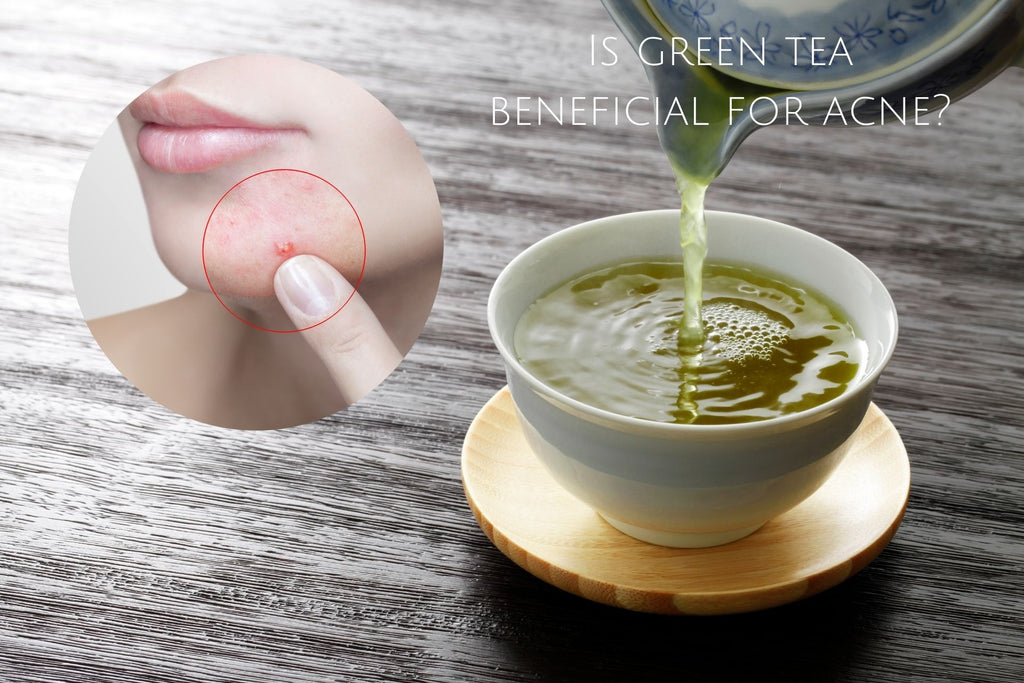
Almost every day, it appears as though a new "solution" for acne is discovered, and there are many excellent prescriptions and over-the-counter treatments to choose from. For those who prefer a more natural, non-chemical approach to treating their breakouts, green tea may be the solution they've been searching for.
The consumption Trusted Source or application of green tea or green tea extract may help alleviate the lesions, redness, and irritated skin that acne produces in specific individuals, according to the findings of researchers Trusted Source.
What role does green tea play?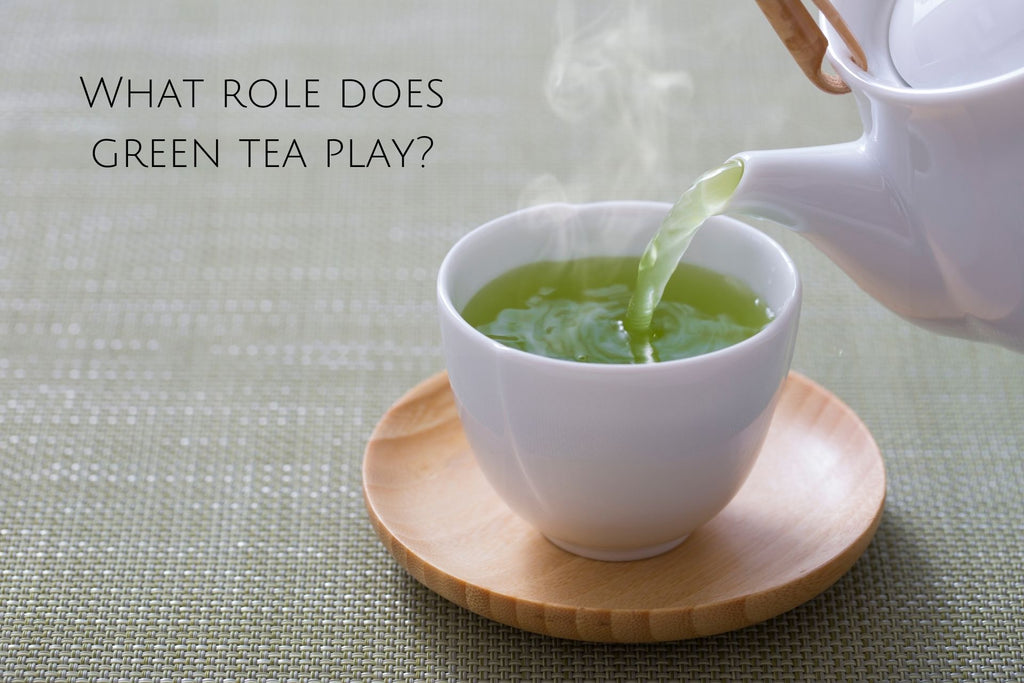
Catechins are a kind of antioxidant found in green tea. Polyphenols, which are plant-based chemicals with antioxidant, anti-inflammatory, and antibacterial effects, are becoming more popular. Free radicals are also targeted by these agents. Green tea is exceptionally high in epigallocatechin gallate (EGCG), a polyphenol that has been proven in studies to be effective in treating acne and oily skin.
EGCG reduces lipid levels while also being anti-androgenic, making it helpful in reducing sebum (oil) secretion in the skin. EGCG also has anti-inflammatory, antioxidant, and antibacterial effects.
What Are the Advantages of Using It?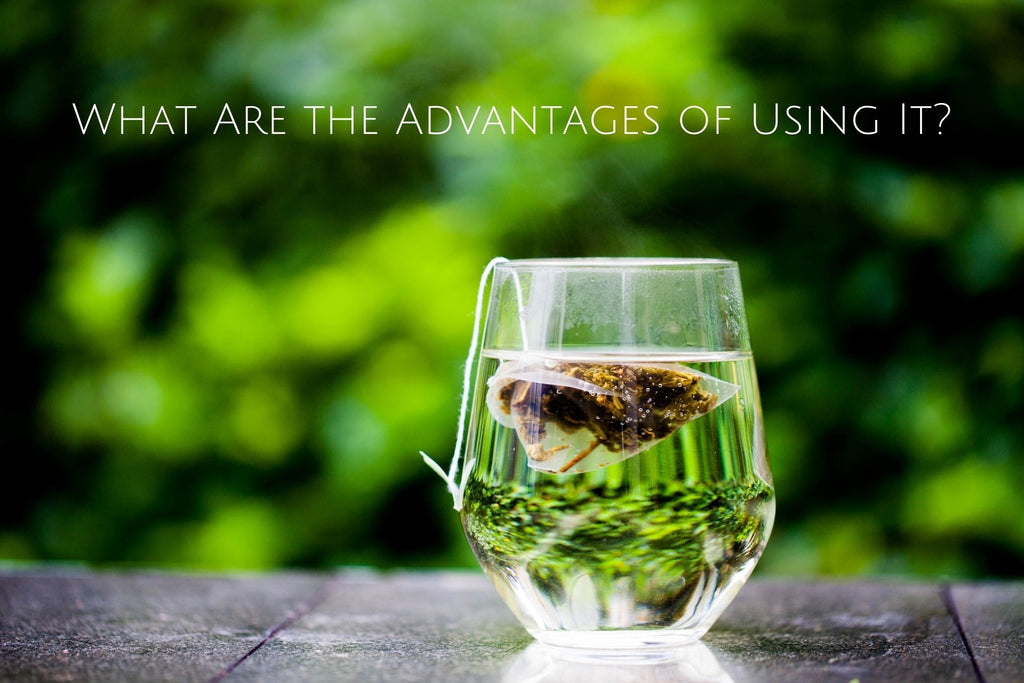
Because of the following advantages, green tea may be beneficial in the treatment of acne vulgaris:
It has anti-inflammatory properties
Green tea has a high concentration of catechins. Epigallocatechin-3-gallate (EGCG) is one of the four main catechins present in green tea, and it helps treat acne and rosacea. Its mechanism of action is to reduce inflammation. The use of 2 percent green tea lotion was shown to reduce inflammatory acne in one research.
EGCG is a potent antioxidant with immunomodulatory and photoprotective effects, among other things. Antiangiogenic (meaning that it inhibits the development of new blood vessels required by tumors for growth) and anti-inflammatory properties
It aids in the reduction of sebum production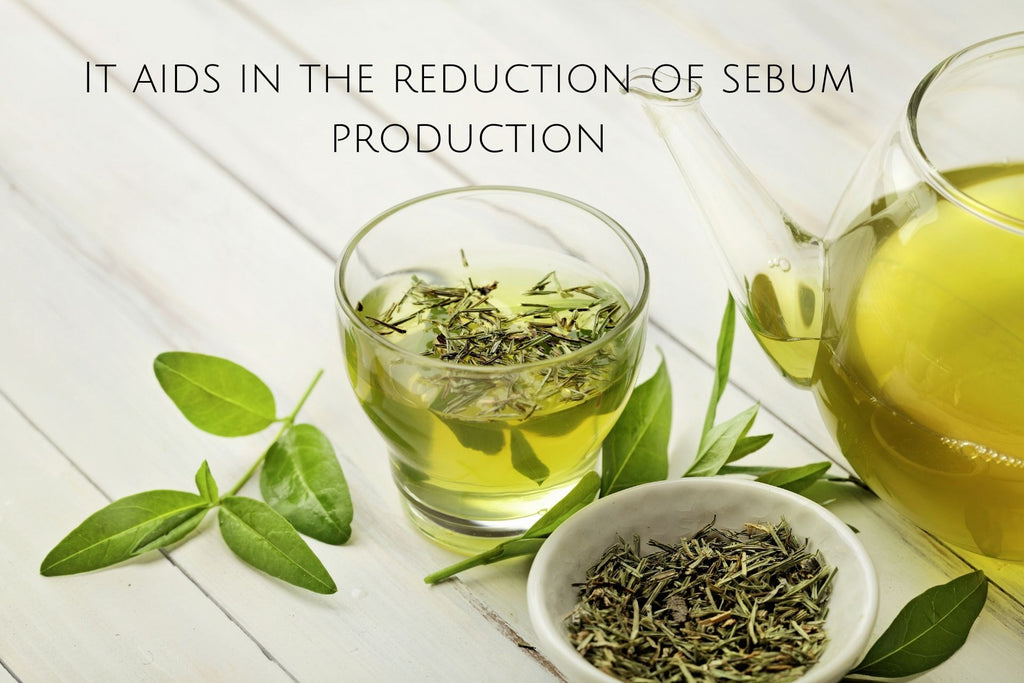
A large amount of sebum produced in the skin is one of the primary causes of acne. Using green tea as a topical application may aid in the reduction of sebum production and the treatment of acne.60-day research including 22 non-smoking, healthy males investigated the effects of a topical green tea extract containing 5 percent catechins on their skin. The use of green tea may also assist in reducing the production of sebum and regulate acne.
Acne is reduced by the polyphenols found in green tea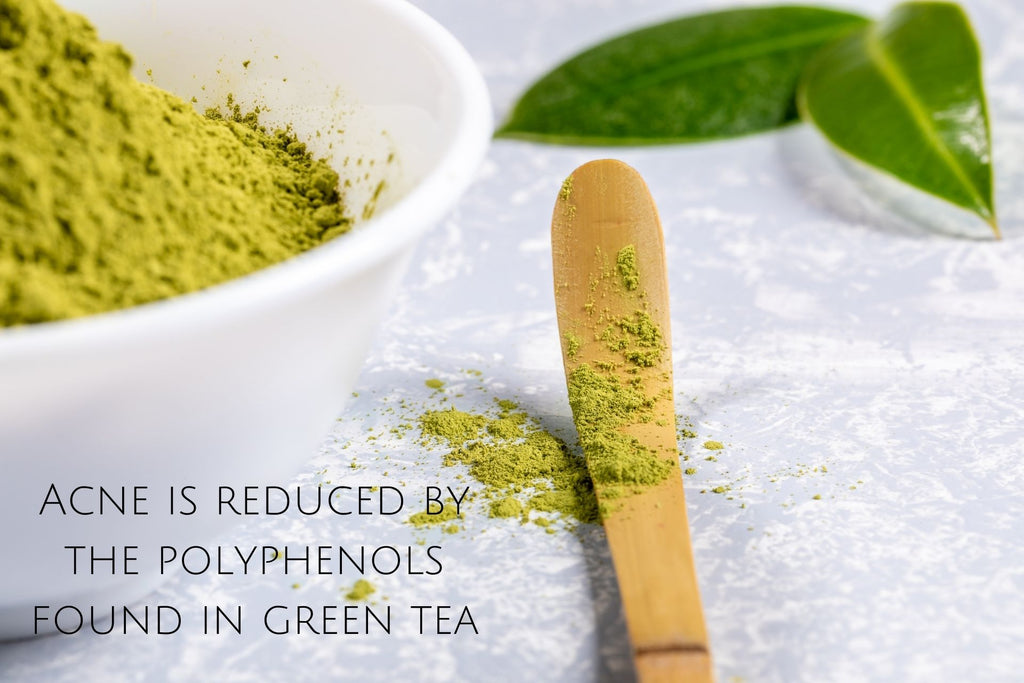
A significant amount of antioxidant activity is provided by green tea polyphenols. Forty-seven individuals with mild to severe acne participated in a scientific study that looked at the effects of 2% tea lotion on their skin.
It aids in the reduction of acne-causing bacteria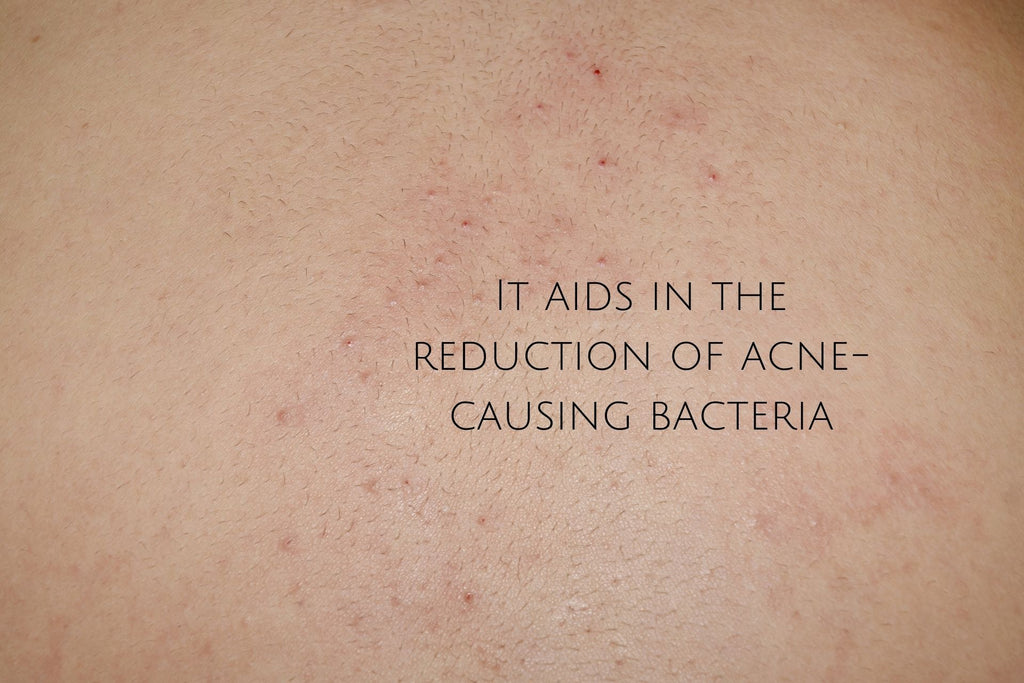
EGCG, one of the four main catechins present in green tea, was shown to reduce acne by preventing the development of the P. acnes bacterium. Also, keep in mind that green tea or any other home treatment may not effectively treat cystic or hormonal acne. To get appropriate therapy, you must speak with a doctor.
Aging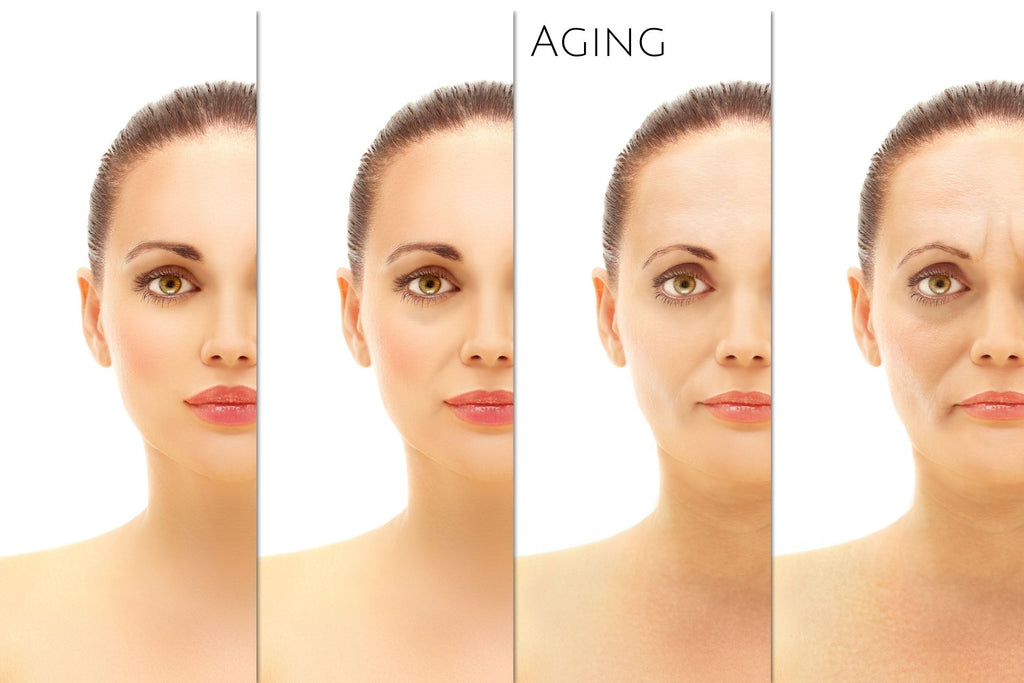
Drinking green tea and applying it to your skin may help you cope with the aging process more effectively and effectively. Trusted sources of 80 women found that participants who received a combined topical and oral green tea regimen had increased skin elasticity. Twenty-four individuals revealed that the topical use of cosmetics containing green tea extract might help to decrease skin damage caused by sun exposure.
Green Tea For Acne Treatment: Simple Home Remedies for Acne
Acne Treatment with Honey and Green Tea 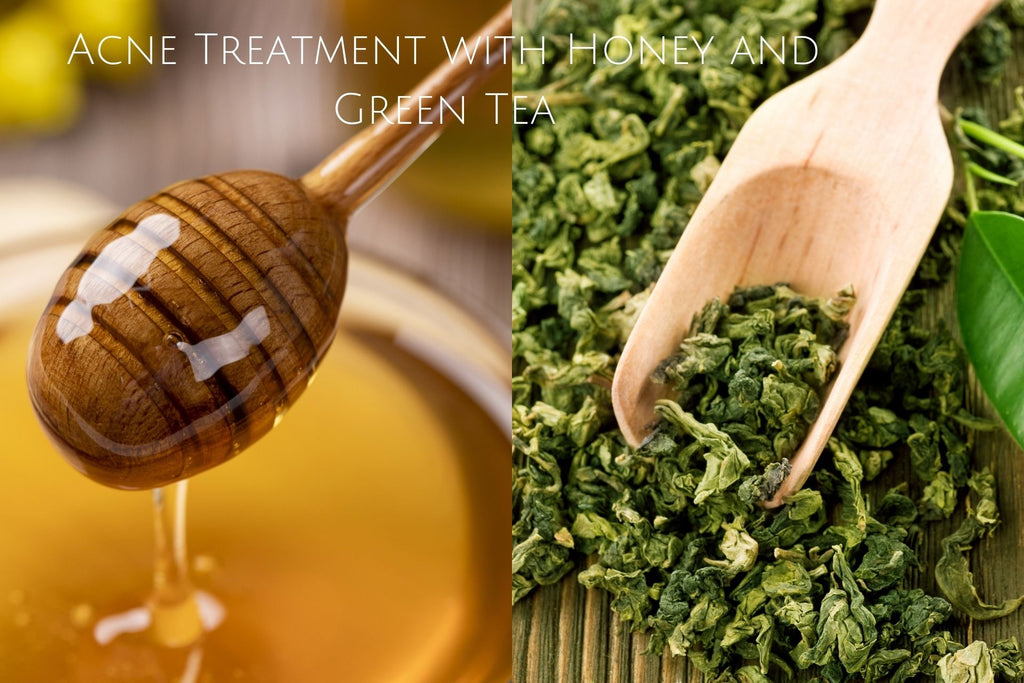
Honey contains antibacterial and wound-healing qualities, making it an excellent choice for cooking. It can prevent the development of the P. acnes bacteria and aid in the reduction of acne.
Method
For about 3 minutes, steep a green tea bag in boiling water. Remove the bag from the oven and set it aside to cool. Remove the leaves from the pack by cutting them open. In a small bowl, combine the honey and the leaves. Wash your face with a facial cleanser and pat it dry after washing it with it. Using your fingers, apply the honey and green tea mixture to your face and allow it to sit for about 20 minutes.After rinsing with cold water and patting dry,
3-4 times a week is recommended.
Acne-fighting Green Tea Face Mist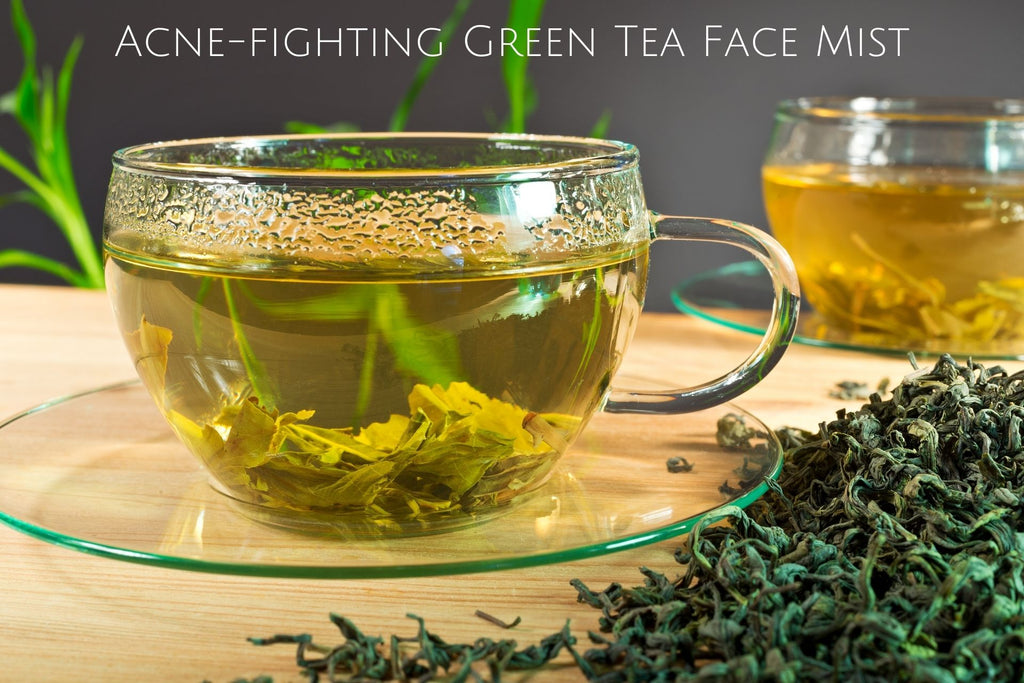
It will assist in calming and relax your skin with this face spray. It aids in the reduction of redness and the treatment of existing acne. Acne may be controlled with the assistance of the polyphenol EGCG found in green tea. If you additionally drink green tea daily, this therapy may be much more beneficial.
Method
Make a cup of green tea and set it aside to cool thoroughly. In this case, you may consume most of it and set aside 2-3 tablespoons for this therapy. Fill a spray bottle halfway with the cooled green tea. Wash your face with a gentle facial cleanser and wipe it dry with a soft cloth after. Allow the green tea to dry on your face after spritzing it on. Wash your skin thoroughly with cold water and wipe it dry with a towel. Use a moisturizer to protect your skin. Two times a day is recommended.
Acne Treatment with Apple Cider Vinegar and Green Tea
There has been no scientific evidence to support ACV's acne-fighting properties. ACV, on the other hand, is a well-known home treatment for a variety of skin problems. It is said to help tone the skin and reduce the appearance of skin pores. It may also help to maintain the pH balance of your skin. After washing your face, you may use this mixture as a facial toner for your skin.
Method
Make a cup of green tea and set it aside to cool thoroughly. Combine the cooled green tea and apple cider vinegar in a glass container and place it in the refrigerator to keep it fresh. (Keep the mixture refrigerated until needed.)Wash your face with a gentle facial cleanser and wipe it dry with a soft cloth after. Apply the mixture to your face, soak a cotton pad in it and dab it on your face. Allow it to dry. Use a moisturizer to protect your skin. Two times a day is recommended.
Acne Treatment with Tea Tree Oil and Green Tea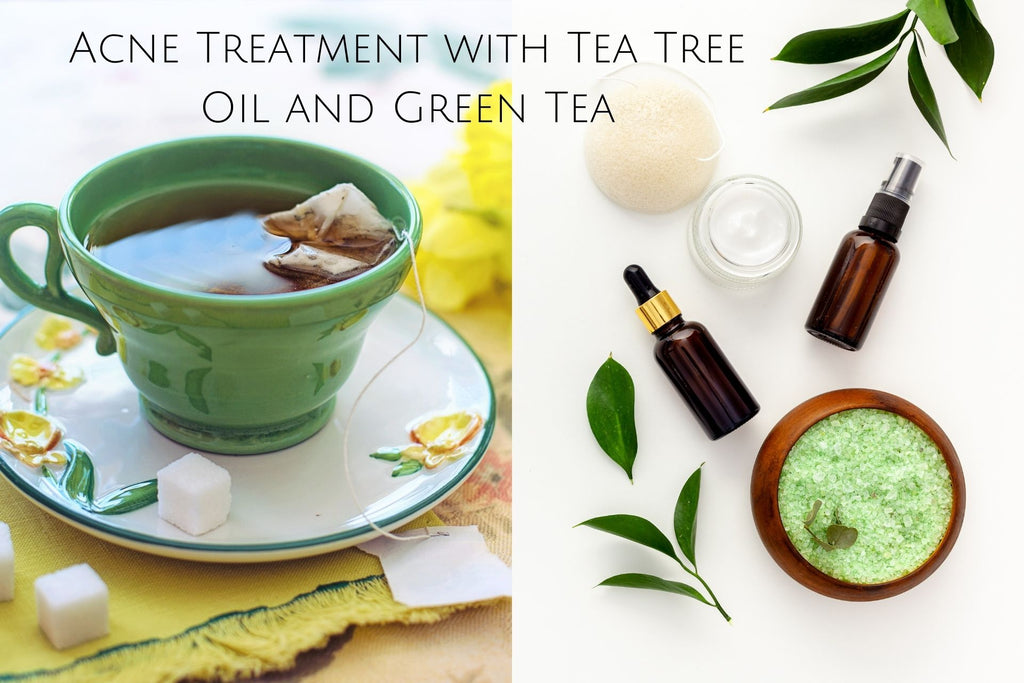
Topical tea tree oil (5 percent concentration) is well-known for its effectiveness in treating mild to severe acne (5). Antimicrobial qualities are significant, and it is helpful in the treatment and prevention of acne.
Method
Make a cup of green tea and set it aside to cool thoroughly. Mix the cooled green tea and the tea tree oil, then place the mixture into a glass jar for safekeeping. (Keep the mix refrigerated until needed.)Wash your face with a gentle facial cleanser and wipe it dry with a soft cloth after. To apply the mixture to your face, soak a cotton pad in it and dab it on your face. Allow it to dry. Before usage, give it a good shake. Use a moisturizer to protect your skin two times a day is recommended.
Acne Treatment with Aloe Vera and Green Tea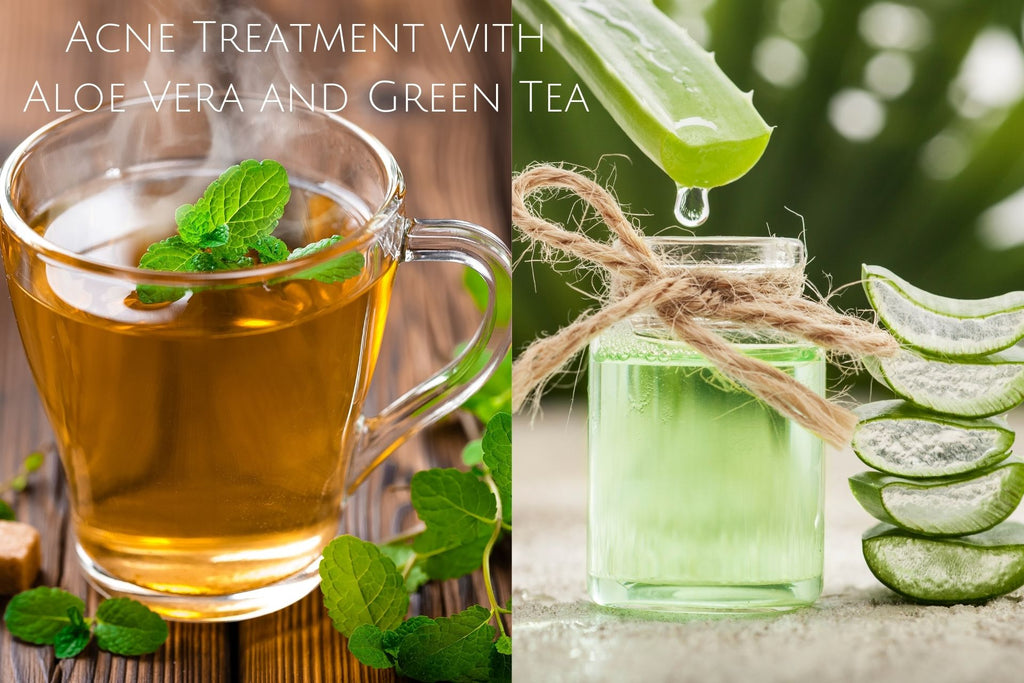
The skin benefits from aloe vera's anti-acne properties. In addition, the mucopolysaccharides in it assist in keeping your skin moisturized by binding moisture to the skin and stimulating the fibroblasts that make collagen and elastin, which helps keep your skin looking youthful and healthy.
Method
Steep two tea bags in a cup of boiling water for five minutes to get a powerful solution. Allow for cooling of the solution. Combine the cooled green tea and aloe vera gel in a glass container and place it in the refrigerator to keep it fresh Wash your face with a gentle facial cleanser and wipe it dry with a soft cloth after. To apply the mixture to your face, soak a cotton pad in it and dab it on your face. Allow it to dry. After that, use your moisturizer.
Two times a day is recommended.
Acne Treatment with Lemon and Green Tea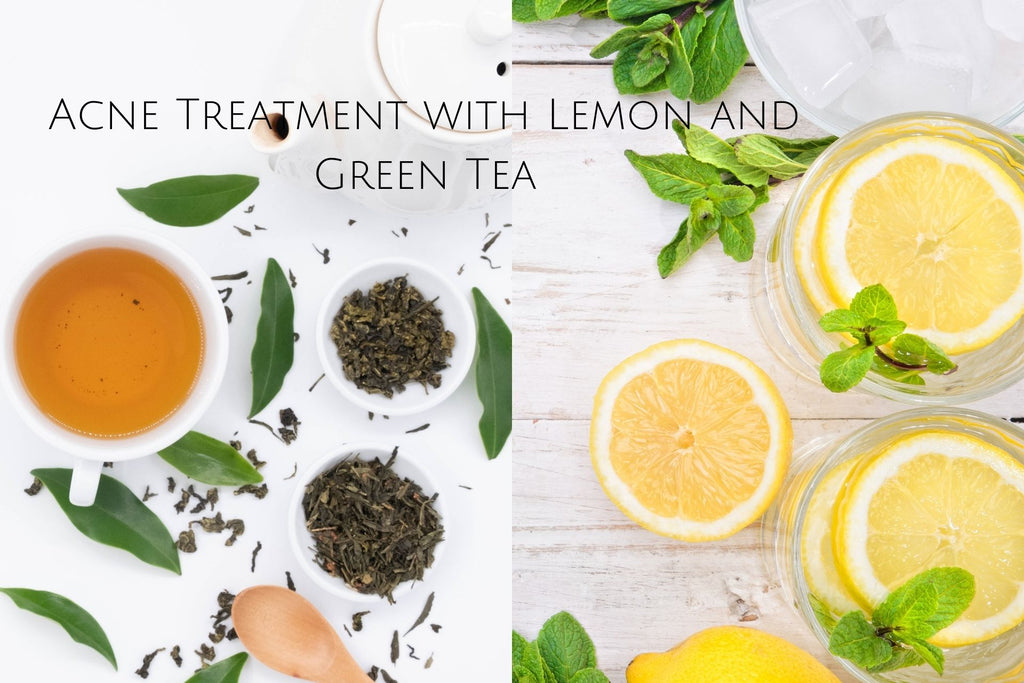
Lemon juice is high in vitamin C as well as citric acid. Several popular home medicines include this herb, and it is utilized for its astringent qualities. It is said to offer moderate bleaching effects as well as the ability to constrict skin pores. Lemon juice, when combined with green tea, may help to keep your skin clear of breakouts. However, it has the potential to make your skin hypersensitive, so use sunscreen anytime you are outside in the sun.
Method
Prepare a quarter cup of green tea and allow it to cool fully before drinking it. Green tea and lemon juice should be mixed and stored in an airtight container such as an airtight glass jar. Wash your face with a gentle facial cleanser and wipe it dry with a soft cloth after. To apply the mixture to your face, soak a cotton pad in it and dab it on your face. Allow it to dry.
Use a moisturizer to protect your skin. Two times a day is recommended.
The Use of Olive Oil and Green Tea to Treat Acne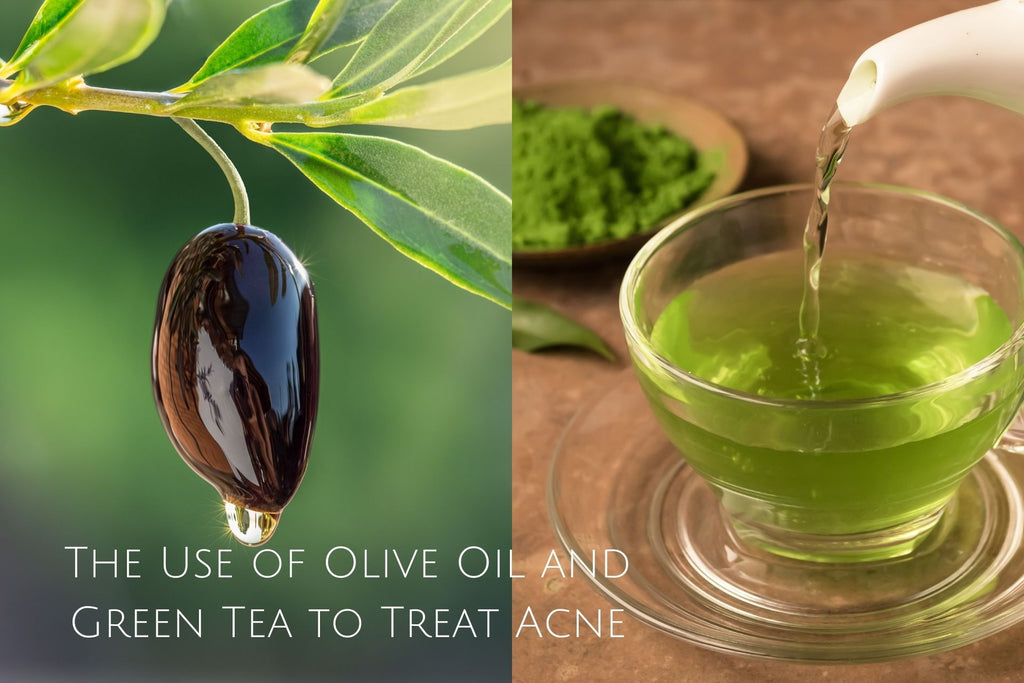
Olive oil is one of the finest choices for oil cleaning because of its versatility. Oil washing helps to remove remnants of makeup and debris from the skin without disrupting the skin's natural pH and moisture balance. It is beneficial to apply green tea brew on your face to calm it down and decrease inflammation.
Method
Make a cup of green tea and set it aside to cool thoroughly. In this case, you may consume most of it and set aside 2-3 tablespoons for this therapy. Fill a spray bottle halfway with the cooled green tea. Apply the olive oil to your face in a circular motion. Allow it to rest for a few minutes. Wring out a washcloth after dipping it in warm water and wiping your face with it. Wash your face with a gentle facial cleanser and pat it dry with a soft cloth after.
Allow the green tea to dry on your face after spritzing it on.
Risks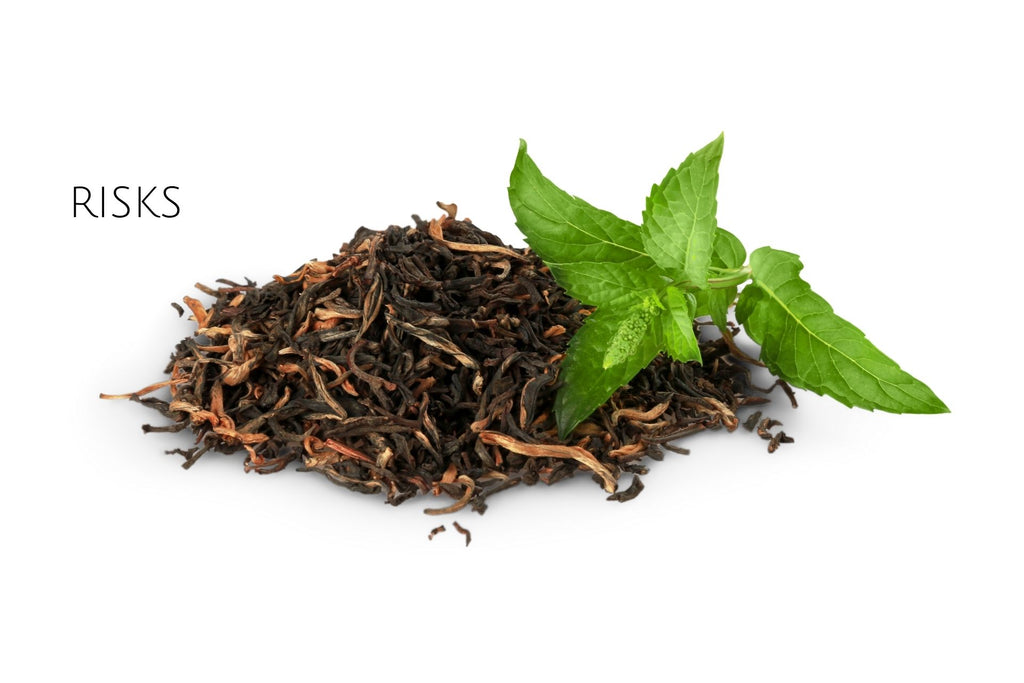
If you're thinking about using green tea supplements, see your doctor first. Before taking a green tea supplement, patients should discuss all of their existing medicines with their doctor to ensure nothing conflicts. The green tea extract may interfere with the beta-blocker nadolol, used to treat high blood pressure and cardiac issues.
High amounts of green tea extract may cause liver damage, according to the European Food Safety Authority and the NIHTrusted Source. In addition, the NIH warns that the caffeine content of certain green tea supplements poses a safety risk.
Drinking green tea, according to the NIH, has minor adverse effects. However, people should be aware that no research has specifically examined the effects of green tea consumption on acne.
Conclusion
Green tea may help clear up acne whether used in cosmetics or as a dietary supplement.
Green tea pills or topical lotions and ointments have been proven in many trials to be beneficial. However, the effective dosage of drinking green tea has yet to be determined. Drinking a few cups of green tea a day is safe and may even benefit your health in the long run. Before beginning any new supplement, including green tea, people should speak with their doctor. Acne that is persistent or severe should be treated by a doctor if you want long-term benefits.
Recent Posts
-
The New Generation of Indian Skincare: Bridging Ayurveda and Dermatological Science
Introduction: For millennia, Indian royalty relied on Kumkumadi Taila—the legendary saffron-infused
-
Red Nails vs Pink Nails: Which Looks More Romantic for Valentine’s Day?
Introduction: Valentine's Day approaches, and with it comes the timeless question: red nails or pink
-
The Wellness Valentine: Valentine’s Day Gift Ideas for Health & Wellness Lovers
Introduction: Valentine's Day has evolved beyond traditional red roses and chocolate boxes. In today





